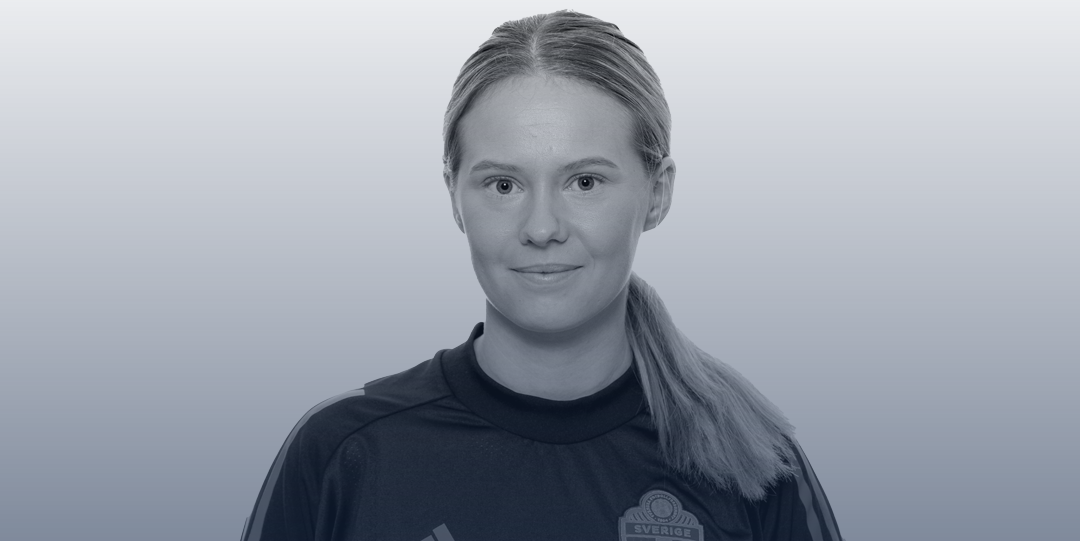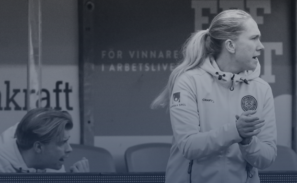Inspired by both her father and grandfather, Lovisa Lundqvist was only 13 years old when she decided to become a football coach. Today, she specializes in physical training at both the OBOS Damallsvenskan level and the national team level.
– I spent hours on Youtube watching Barcelona and Liverpool coaches, trying to learn from the clubs as well as my father and grandfather. I looked up to them because they were so passionate about football and I wanted to go the same way, says Lovisa Lundqvist.
Lovisa Lundqvist didn’t have a prominent playing career. She spent her twenties on the field with the third league team, Sollentuna, before finishing her career at the fourth-tier club, Djursholms FC, in 2021. After that, she retired from playing.
However, Lovisa Lundqvist didn’t plan to leave football entirely. By the age of 21, she already had several years of coaching experience. Growing up in Rosersbergs IK, it was expected that everyone would contribute.
– It’s a club where everyone works non-profit, and both my dad and grandfather were coaches for women’s and men’s teams. I started my football education very early and observed everything and everyone in my environment. While playing at Rosersberg, I worked with various coaches and gradually developed a personal set of leadership qualities that I valued to varying degrees.
During high school, she played for Sollentuna FK, where she naturally began helping with the club’s girls’ teams once a week
– I gained numerous new coaching colleagues to observe and learn from. Soon, I felt a strong desire to make a more personal contribution to players’ development. This led me to work for Molinatti Football School, founded by Thibaut Molinatti, who is now a co-owner of the Skills Academy. There, I conducted individual training sessions from early morning before sunrise to late evening, every day of the week, for boys and girls aged 10 to 30 from various small and large clubs in Stockholm.
She pursued further education in coaching, specializing in football, at the School of Gymnastics and Sports (GIH). In 2020, she also obtained UEFA’s B license.
– In the training planning course taught by Helena Andersson at GIH, I fully realized something I had long considered. I am passionate about incorporating physical fitness into football training. Whether in group or individual sessions, I have consistently integrated speed and strength into the exercises, often subconsciously, says Lundqvist.
At the same time, she was offered the position of assistant coach for the IF BP women under 19 teams. This role presented new challenges and opportunities for her coaching development, and she played a significant role in initiating a successful period for the girls’ academy. Additionally, thanks to financial support from Elitfotboll Dam for training female coaches, she was able to participate in the Swedish Football Association’s first edition of Tränarutbildning Fotbollsfys (a football fitness coach course).
– I was eager to dive deeper into the concepts I had explored during my courses at GIH and my time at BP, where I experimented with space, time intervalls, and player numbers to enhance various physical skills. Both the course participants and the trainers were exceptionally skilled.
While attending the course, Lovisa Lundqvist received a call from former national team player Sara Thunebro, who was overseeing a project on training load analysis using GPS for the federation. Lundqvist was then given the opportunity to serve as a physical trainer at a girls’ national team camp in the summer of 2021.
– This opportunity was beyond my wildest dreams. Working alongside highly skilled coaches like Caroline Sjöblom, Carola Söberg, and Maria Busk Madland was an invaluable experience. Additionally, having the chance to coach some of Sweden’s top players born in 2003 and 2004 was absolutely fantastic for me.
– I gained so much from that camp, and subsequently, I was trusted and honored to work with the 2005 team. Little did I know my first camp with them would mark the beginning of something truly significant. Being surrounded by doctors and physiotherapists who are passionate about sports medicine and the long-term education of our youth was incredible. This applies to all national teams, from the U23s to the U17s, including a European Championship we hosted, which I had the privilege of being involved in.
Lundqvist thrives in BP, advancing her career from being in charge of physical training at the academy to now fulfilling the same role for the women’s team competing in the OBOS Damallsvenskan. Concurrently, she continues to enhance her education and is set to start her third year in the coaching program at GIH this fall.
What qualities do you consider most crucial to being a successful coach?
– As a football fitness coach, it is important to focus very much on relationships, to confirm competence and distribute responsibility within an already very experienced group. In football, all players need to be involved if we are to achieve our goals, it’s not a player who individually makes the team win or lose a match. In elite football there is an incredible focus on results, something I think is important but must not be decisive or stand in the way of long-term development of our youngest players.
– I also think it is an advantage to have a high self-awareness as a coach. To know their strengths and weaknesses and to display this transparent image of themselves as the collective always needs to be put before self-interest.
What challenges do you usually face in your work as a coach, and how do you deal with them?
– Being relatively young, I often face the challenge of others questioning my competence and experience. This doubt also feeds into self-criticism among young female coaches, who may hesitate to assert themselves in a field traditionally dominated by men. It’s crucial to acknowledge that our journey as coaches is never complete; there is always more to accomplish and learn.
– I manage this challenge by setting clearer boundaries between work and personal life, and by surrounding myself with people who energize rather than drain me.
What is your goal as a coach?
– Helping players who are eager to advance their football skills by providing the right tools. It’s always up to the player but if I can play a small, small part in helping players physically, no one will be happier than me. As the physical demands in women’s football continue to rise, my goal for BP—a team that has struggled in recent seasons—is to keep pace with this progression.
What is your vision for yourself and for women’s football in general?
– That I will become a leading expert in my field of physical training and sports performance. In this way, I can perhaps at the same time be instrumental in ensuring that women get the same conditions for sports as men. Internationally, women’s football teams benefit from extensive medical teams around them. I envision the same for Sweden’s women’s football, a vision that is gradually taking shape in clubs like BK Häcken. They have hired a head of performance and assembled a team of football fitness coaches, each specializing in different areas, all collaborating for the benefit of the players.
What needs to be done to bring out more female coaches at the elite level?
– I believe the initiative of Elitfotboll Dam in the Elite Coaching Pathways and the Swedish Football Association’s ’tränarlyftet’ project, which encourages more women to pursue the UEFA B course, is crucial. But to reach the elite level often requires more than that. The responsibility lies with the Swedish Football Association and their training programs to ensure that more women enroll in the UEFA A course to advance their careers. Additionally, Swedish clubs need to actively encourage female participation in all aspects of elite football, whether as coaches, equipment managers, event coordinators, or board members
2024-08-29













